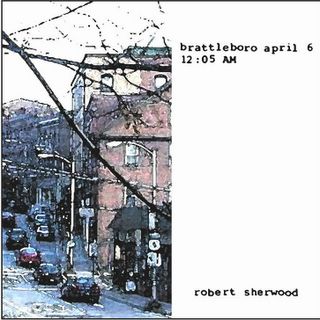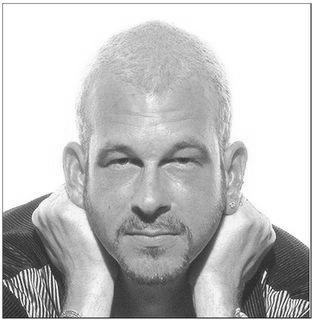From The North There Shall Come A Giant

Wow, Robert Sherwood is coming from the Land Of Some Heavy Shit on this record. With fully half of the record being live, solo vocal/piano performances Robert seems to have intentionally given himself nowhere to hide. When full instrumentation kicks in, whether its the live string section of Song For The Weary or the Enoesque treated-piano clouds in the bridges of Station Road, it is apt to kick out with as little warning. I think the best thing that can happen with digital recording is that people realize that it allows for simplicity and drama of soundstage, for emptiness, as much as it does for a million tracks. What Sherwood does is that pointillist thing where he builds his arrangements out of dozens of tiny details, little instrumental events that build and create a song. Negative space is deployed liberally.
Clearly a Roxy Music thing, Sherwood states, Ferry was a visual artist when they started and was into Pop Art, Pointillist Art; he wanted to express himself that way in sound. Ive never approached a recording that way because its daunting in the analog realm. With digital you can just play in the sandbox. You can do anything you want.
You can build different scenarios for each section of a song and paste them together into an optimal whole. Thats why I do the solo pieces; to stay in touch with the work of getting from the beginning of a song to the end. Its a lot of work.
A lot of very good work, indeed. The opener Matinee is a muted wave of loving sadness, a pretty lament wrapped in drumbox and Fender Rhodes. Love is metaphor-ized as a childs trip to the movies where you make me feel/like the curtain might catch me crying . There is bit of Cole Porter in the songs completeness of cadence, in the waves of ultra-rich vocal harmony that lift the choruses in an exaltation of grief.
For One Another is the most accomplished of the solo pieces, a Great American Songbook sort of thing that is approached classically and turned into a series of extrapolations of its main motif. The modality jumps from Chinese to jazz, the chording and voice leading from baroque to modern balladry. The climactic final chorus is cheekily raised a half-step in best Bacharach tradition. The craftsmanship of this performance is really sick. The piano performance alone is so accomplished, so old-school rich and dramatic, that one cant picture this being anything but a piano/vocal piece.
Another one of these solo songs, the resigned Paul McCartney, sews a Chopin-like 2- minute piano interlude into the fabric of the piece. This travels from classical minimalism to Rhapsody In Blue exclamations to starkness and despair before fading away on a wave of major runs and slurries.
Station Road tells the story of someone, ostensibly a middle-aged or older man crashing into some humbling experience of deep loss and never fully recovering. The chorus takes him back to the joys of childhood, the more to offset the stark, numbed narrative of the verses. A bridge intrudes that is pure Phillip Glass; a series of pianos playing several motifs in different time signatures that interlock into a rising expression of dread that overflows into the simple, lonely last verse, a la A Day In The Life. This is reintroduced at the end of the song and leaves us on a note of (what else) uncertainty.
Sherwoods Brattleboro April 6 12:05 AM begins as a rumination on an April snowstorm in Vermont and builds into a sweeping travelogue that pits beautiful New England against the harsh desert fastness of Los Angeles. A deep melancholy resides in the grooves here, the author clearly in thrall with the drifting snow, the climbing headlights.
All in all this is the sort of record a person could get real close to, a record filled with rich, sad stories. With its contrasts, emotional honesty and wildly variant soundstage it rewards each listen like a classic. Repeated listens reveal Sherwood to possess a playful tendency to namedrop in words and music his musical idols. The fabs are mentioned in "Paul McCartney", "Maybe Next Time" and "Station Road" and more esoteric mini-homages are paid Stevie Wonder, XTC, Rufus Wainwright, The Beach Boys and Bach. Quite a deep and amusing affair indeed.



1 Comments:
Hey, thanks for the awesome review! The awesome GAY review. At least you got the "Giant" thing right.
Post a Comment
<< Home